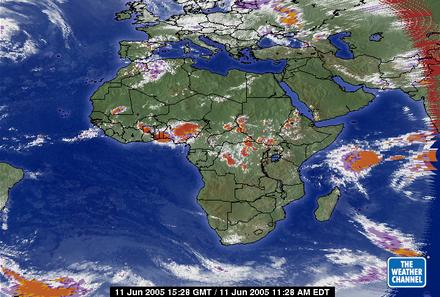Dr. Assaf Rosenthal

Direct link to this page: https://www.hayadan.org.il/rosental120605.html
We all heard about the terrible drought periods that hit the Sahel in the eighties of the last century, the Sahel is that semi-desert strip that is south of the Sahara. In recent years the picture changes from end to end in the geographical meaning of the change. In the south of the continent drought periods are more and more frequent (almost every year), while the arid Sahel is more rainy, unfortunately the rains in the Sahel fall (like in the desert) in cloud fragments and cause floods and floods that are more harmful than beneficial, the inhabitants of the Sahel do not know a strange climate and do not know how to escape from the wadis which turn into gushing rivers, the banks of the wadis near which are located dying villages and the vulnerability of property and soul is enormous.
So what's going on here? It turns out that two separate causes that are not related to each other cause the change. What causes dryness in the Sahel is the cold current that flows in the Atlantic Ocean parallel to the coast of West Africa, the same "Benguela current" that comes from the far south - Antarctica, "attracts" the moisture to it and prevents condensation over the land, prevents rain, this is the cold current that passes close to the coast of Namibia and creates the desert The famous Namib. The current moves away from the coast of West Africa, therefore there is a lot of rain and approaches the coast in the north, affecting the dryness in the Sahel and intensifying it in the Sahara.
Like many other factors, the Benguela current changes its course cyclically (which is still unknown) and from time to time approaches the coast, its approach to the coast causes it to heat up and then the dry climate in the Sahel becomes more humid and allows rain, in addition to this global warming also causes the Atlantic Ocean to warm up (slightly) and thus moderate the effect The cold Benguela stream.
But this cycle does not cause the rainy systems that cause floods in recent years, in order to receive so much rain an additional factor is needed and this is where we (human activity) come into the picture. According to measurements, the waters of the Indian Ocean have warmed by one degree in the last fifty years. Whether because of the rotation of the earth around the sun (Milenkiewicz cycle) or because of the famous and discussed greenhouse effect, it doesn't matter at the moment what the reason is, the fact exists: the Indian Ocean is warmer, according to computer simulations that included data from measurement points scattered over the Indian Ocean, it turns out Because the warming of the water causes the monsoon winds to divert.
The ocean water evaporates and condenses into the clouds, the clouds are transported to the continent by the monsoon winds so that the monsoons are actually the rain providers for Africa. It turns out that as the waters warm, the monsoons shift northward, the shift northward leaves Southern Africa without the seasonal rains its residents are used to and causes drought.
On the other hand, the same shift moves the clouds to the north, to the dry Sahel. The meeting of clouds saturated with moisture in the relatively cool air coming from the west causes cloud fragments that bring down torrential rain that causes floods above and beyond the familiar, expected and known. According to computer simulations, this trend of periods of drought in southern Africa and high humidity, rains and floods in the Sahel, will increase as the Indian Ocean warms.
Apparently, this system has a direct effect on us: as a regular resident of Eilat, I used to experience southerly storms in the bay every spring and fall, storms that raised high waves that washed the beaches and cleaned the seabed of algae, the storms blew under the influence of the famous "Red Sea Trough". The depression does appear from time to time, but for about fifteen years no strong storms have blown.
A compilation of Dr. Assaf Rosenthal's articles on the Hidan site
Environmentalist - Earth
https://www.hayadan.org.il/BuildaGate4/general2/data_card.php?Cat=~~~185149612~~~218&SiteName=hayadan
